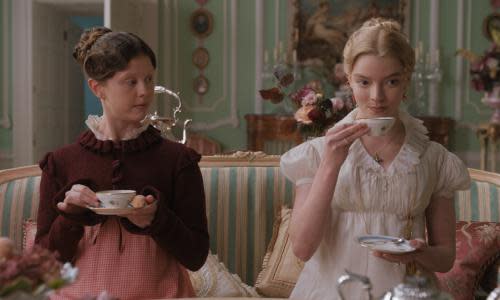Emma review – Austen's sweet satire gets a multiplex makeover

With its heady mix of social satire, romantic intrigue and endlessly reinterpretable gender politics, Jane Austen’s 1815 novel Emma has long proved catnip for film-makers. The 2009 TV miniseries starring Romola Garai followed a string of small-screen productions, dating back to such offerings as a 1948 BBC “telefilm” with Judy Campbell. Recent big-screen adaptations have ranged from Douglas McGrath’s 1996 hit featuring Gwyneth Paltrow (for which composer Rachel Portman won an Oscar) to the 2010 Hindi-language romcom Aisha with Sonam Kapoor. For many, however, Amy Heckerling’s 1995 “queen bee” treat Clueless remains a favourite, astutely transposing the British riffs of Austen’s source to the modern milieu of an American high school.
This latest colourful incarnation boasts the remarkable Anya Taylor-Joy as Austen’s “handsome, clever and rich” heroine Emma Woodhouse, spoilt daughter of a doting widowed father, who has lived nearly 21 years “with very little to distress or vex her”. With no responsibility beyond the care of her draught-obsessed papa (a mournful Bill Nighy, dressed to accentuate his pipe-cleaner limbs), Emma entertains herself by match-making, presumptuously manipulating the relationships of those around her.
De Wilde, a veteran music-video director, here takes flirtatious liberties with Austen
When the comparatively lowly Harriet (played by Mia Goth with an infantile innocence that extends from saucer-wide eyes to a gambolling playground gait) falls into Miss Woodhouse’s circle, Emma rudely diverts her from the course of true love. Instead, she sets her sights on the clearly unattainable – and entirely inappropriate – Mr Elton (Josh O’Connor, oozing insufferable divinity). Meanwhile, neighbouring friend-in-law Mr Knightley (Johnny Flynn, combining vulnerability with a weapons-grade animal magnetism notably absent from Austen’s novel) circles Emma with an air of both adoration and exasperation, lamenting her casual cruelty while secretly admiring her wit and beauty.
Directed by rock photographer and music-video veteran Autumn de Wilde, from a script by Man Booker prize winner Eleanor Catton, this latest Emma. (self-consciously styled in the title with a full stop) takes flirtatious liberties with Austen, to often hilarious effect. There’s a strong element of screwball comedy at play (De Wilde cites Bringing Up Baby as an inspiration alongside John Hughes’s coming-of-age movies), an approach that pays crowd-pleasing dividends, even as it reduces the complexities of the original text to a rather more caricatured screen romp.
Having introduced Mr Knightley galloping gamely on a steed before watching him strip naked, De Wilde employs a mirrored bum-flashing motif that playfully suggests fleshy passions in her otherwise politely distanced leads. Later, the sturdy cinematic spectacle of dance doesn’t so much whisper what is left unsaid by the dialogue as scream it, ensuring that cinema audiences know exactly what’s going on, even as readers are still figuring it out. Elsewhere, scenes of near-slapstick mastication rub shoulders with moments in which existential unease mutates into something closer to sitcom-style silliness – flimsy, but great fun.
Musically, Emma. juxtaposes folk tunes with operatic voices as the action traverses social boundaries, with composers Isobel Waller-Bridge and David Schweitzer linking characters to instruments (a harp for Emma, a bassoon for Mr Knightley) in their cues. Live performances play a key role, too, from the piano duelling of Emma and Jane Fairfax (the multitalented Amber Anderson) to a duet in which Knightley sings and plays violin while Emma seethes silently from a distance.
Related: Bill Nighy: ‘It takes me a long time to recover if I see myself on screen'
The impressive ensemble cast includes Miranda Hart, who gets the balance between pathos and pratfalls just right as the loquacious but unjustly wounded Miss Bates. As the abrasive Mrs Elton, Tanya Reynolds deploys a raised chin and the merest hint of a sneer to excellent effect, while Callum Turner’s Frank Churchill is the cad incarnate.
In the lead role, Anya Taylor-Joy creates an admirably spiky character who is less likable than some of her screen predecessors, and all the better for it. There’s a touch of Liza Minnelli in the juxtaposition of Taylor-Joy’s angular face and window-to-the-soul eyes, something that enables her to telegraph contradictory emotions with apparent ease – a silent-movie quality perfectly suited to this role.
As production designer, Kave Quinn conjures a lavish environment in which the possibility of treading mud into cloistered enclaves remains a perceived threat, and costume designer Alexandra Byrne dresses the cast in a series of intrusively high collars that appear to offer everyone’s head on a platter – a neat visual metaphor for Austen’s guillotine-sharp social satire. The film may blunt some of the edges of that satire for the multiplex market, but it’s still in there, continuing to inspire new adaptations of what remains a timeless text.

